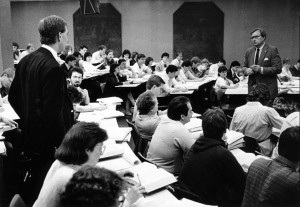Drug overdose deaths don’t usually make big headlines. But ask Brad Schimel about his priorities as Wisconsin’s still quite-new attorney general (he took office in January) and they are at the top of his priorities. Here’s a powerful reason why:
More people die each year in Wisconsin from overdoses of opiate drugs, the kind issued through prescriptions at drug stores, than die from breast cancer, traffic accidents, hand guns, or heroin combined, Schimel said during an “On the Issues with Mike Gousha” program at Eckstein Hall on Sept. 23.
Seventy percent of heroin addicts got addicted to prescription pills first, Schimel said, and seventy percent of the prescription drug addicts got pills from friends or family members, Schimel said.
Schimel announced in mid September a campaign called “A Dose of Reality” to increase awareness of the extent of prescription drug abuse in Wisconsin. He said the medical community of the state was cooperating in promoting education and more precautions not only in the general public, but in medical jobs that involve providing such drugs. Many in the medical sector are not aware of how widespread the problems of abuse are. Schimel said in announcing the campaign.
Schimel told Gousha he met many times with families of those who died of such abuse while he was Waukesha County district attorney, his job before becoming district attorney. He said it was myth that those who died were “bad kids.” Schimel said, “I’ve yet to find a parent who had the bad kid. These are good kids.” They came from a wide range of backgrounds and lifestyles. And those who die, in general, come from all parts of the state, rural, suburban and urban, and grew up in homes across the spectrum of income levels, he said.
The Dose of Reality campaign is aimed at promoting drug treatment and effective law enforcement work, as well as public education.
In his conversation with Gousha, the Law School’s distinguished fellow in law and public policy, Schimel also touched on other issues the attorney general’s office is facing.
He agreed that there appear to be conflicting provisions in federal rules related to whether Wisconsin can require people who receive public aid to purchase food to undergo drug tests. Republicans in the Legislature passed such a law this year, but it is being challenged in court.
“Ultimately that’s what courts do, they decide when there is a conflict of laws,” Schimel said. “We’re going to have this resolved there.”
Schimel also stood by his firm position on maintaining Wisconsin’s strong record of open government and access to public records. Schimel, who won office as a Republican, said sometimes it is necessary to go against the wishes of Republican law makers. In this instance, some Republicans tried to push through substantial changes in open government rules several months ago. Schimel’s opposition was a factor in those changes being pulled off the table after initially getting support.
Schimel also discussed Wisconsin’s participation in fighting tighter air pollution laws backed by the Obama administration and the slow start to a planned joint state-county-city effort to crackdown on gun crimes in Milwaukee. He commented in general terms on the John Doe investigation related to campaign activities on behalf of Gov. Scott Walker, but he did not give a direct answer to a question on whether he thought Milwaukee County District Attorney John Chisholm engaged in a “witch hunt,” as some Republicans have said.
Video of the one-hour program may be watched by clicking here.
 standards required for human consumption, pumps water to our communities and businesses, and finally treats wastewater before releasing it to the environment. That relationship was the focus of a joint meeting held here at Marquette University earlier this month between The Water Council and the Mid-west Energy Research Consortium. The two organizations plan to design a joint roadmap to advance local efforts, including academic research, in the “energy-water nexus.”
standards required for human consumption, pumps water to our communities and businesses, and finally treats wastewater before releasing it to the environment. That relationship was the focus of a joint meeting held here at Marquette University earlier this month between The Water Council and the Mid-west Energy Research Consortium. The two organizations plan to design a joint roadmap to advance local efforts, including academic research, in the “energy-water nexus.”
